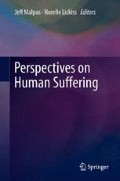Abstract
This chapter explores classical Mediterranean thought on suffering through a detailed examination of one Greek tragedy, Sophocles’ Philoctetes, in which both moral philosophy and medicine also feature. Suffering in this play has no inherent metaphysical or ethical status, but it does raise the rather practical as well as ethical question of how other human beings can and should respond to the sufferer—examining in close detail how an individual’s acute suffering deforms his everyday life and his relationships with his or her community and showing how very differently individuals respond to the suffering of others. It even asks the proto-Utilitarian question of whether the suffering of a single individual should be allowed to outweigh the interests of the whole community. There is perhaps no other artwork that explores so intensely the problem which incurable suffering presents to the community to which the sufferer belongs.
Access this chapter
Tax calculation will be finalised at checkout
Purchases are for personal use only
Notes
- 1.
- 2.
- 3.
On ancient asceticism see Perkins (1995).
- 4.
Machaon, the archetypal surgeon, and his brother, who represented medicine and pharmacology.
- 5.
For a brilliant comparative study of the metaphors for pain in ancient Greek and contemporary English, see Budelmann (2010).
- 6.
- 7.
See Hall (2004, pp. 11–12), with Fig. 2. The production was entitled Philoktetes Variations, directed by KanRitsema, and performed at the Kaaitheater. Vawter’s naked body, covered with purple Kaposi rash, ‘spoke a more forceful language than his and his fellow actors’ words’, according to Laermans (1994, p. 68).
- 8.
See http://www.philoctetesproject.org/pdf/Philoctetes_Project.pdf.
Bibliography
Amato, Joseph D. 1990. Victims and values: A history and theory of suffering. New York: Greenwood Press.
Aristotle. 1968. Poetics, ed. D.W. Lucas. Oxford: Clarendon Press.
Avery, Harry C. 1965. Heracles, Philoctetes, Neoptolemus. Hermes 93:279–297.
Budelmann, Felix. 2010. The reception of Sophocles’ representation of physical pain. American Journal of Philology 128 (4): 443–467.
Cohen, Stanley. 2001. States of denial: Knowing about atrocities and suffering. Cambridge: Polity.
Eagleton, Terry. 2002. Sweet violence: An essay on the tragic. Oxford: Blackwell.
Edwards, Rem. 1984. Pain and the ethics of pain management. Social Science and Medicine 18 (6): 515–523.
Frank, A. W. 2001. Can we research suffering? Qualitative Health Research 11 (3): 353–362.
Hall, Edith. 2004. Introduction: Why Greek tragedy since the late 1960s? In Dionysus since 69: Greek tragedy at the dawn of the third millennium, eds. E. Hall, F. Macintosh and A. Wrigley. Oxford: Oxford University Press.
Hall, Edith. 2006. The theatrical cast of Athens: Interactions between ancient Greek drama and society. Oxford: Oxford University Press.
Hall, Edith. 2007. Trojan suffering, tragic gods, and transhistorical metaphysics. In Tragedy in transition, eds. Sara Annes Brown and Catherine Silverstone. Oxford: Blackwell.
Hall, Edith. 2009. Deianira deliberates: precipitate decision-taking and Trachiniae. In Sophocles and the Greek tragic tradition: Studies for patricia easterling, eds. S. Goldhill and E. Hall. Cambridge: Cambridge University Press.
Hall, Edith. 2010a. Bringing together nature and culture: On the uses and limits of cognitive science for the study of performance reception. In Theorising performance reception: Greek drama, cultural history, and critical practice, eds. Edith Hall and Stephe Harrop. London: Duckworth.
Hall, Edith. 2010b. Greek tragedy: Suffering under the Sun. Oxford: University Press.
Jebb, R. C. 1898. Sophocles: Philoctetes, 2nd edn. Cambridge: Cambridge University Press.
Laermans, Rudi. 1994. Halfway to the Grave. Theater 25:67–70.
Morris, D. 1991. The Culture of pain. Berkeley: California University Press.
Patterson, Orlando. 1982. Slavery and social death: A comparative study. Cambridge: Harvard University Press.
Patterson, Orlando. 1999. Rituals in blood: Consequences of slavery in two American centuries. New York: Basic Civitas Books.
Perkins, J. 1995. The suffering self: Pain and narrative representation in the early Christian era. London: Routledge.
Pickering, W. S. F., and Massimo Rosati. 2008. Introduction. In Suffering and evil: The Durkheimian legacy, eds. W. S. F. Pickering and Massimo Rosati. New York: Durkheim Books.
Rey, R. 1993. The history of pain. Cambridge: Harvard University Press.
Schweizer, Harold. 2000. Against suffering: A meditation on literature. Literature and medicine 19:229–240.
Sophocles. 1994. Philoctetes, vol. 2. Loeb Classical Library. Trans. H. Lloyd-Jones. Cambridge: Harvard University Press.
Sternberg, Rachel Hall. 2005. Pity and power in ancient Athens. Cambridge: Cambridge University Press.
Sternberg, Rachel Hall. 2006. Tragedy offstage: Suffering and sympathy in ancient Athens. Austin: University of Texas Press.
Wilkinson, Iain. 2005. Suffering: A sociological introduction. Cambridge: Polity Press.
Author information
Authors and Affiliations
Corresponding author
Editor information
Editors and Affiliations
Rights and permissions
Copyright information
© 2012 Springer Science+Business Media B.V.
About this chapter
Cite this chapter
Hall, E. (2012). Ancient Greek Responses to Suffering: Thinking with Philoctetes. In: Malpas, J., Lickiss, N. (eds) Perspectives on Human Suffering. Springer, Dordrecht. https://doi.org/10.1007/978-94-007-2795-3_13
Download citation
DOI: https://doi.org/10.1007/978-94-007-2795-3_13
Published:
Publisher Name: Springer, Dordrecht
Print ISBN: 978-94-007-2794-6
Online ISBN: 978-94-007-2795-3
eBook Packages: Humanities, Social Sciences and LawPhilosophy and Religion (R0)

